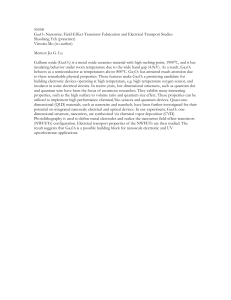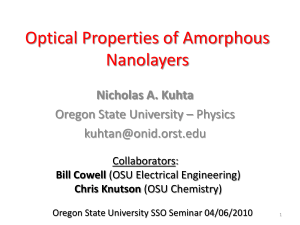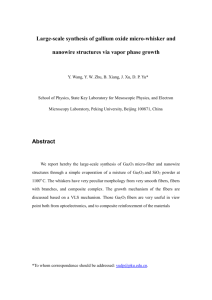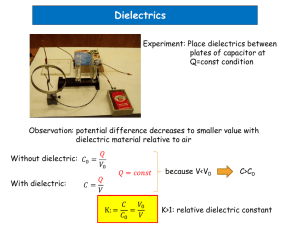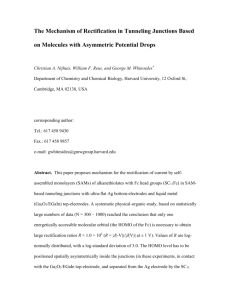Characterization of Ga 2 0 3 Single Crystal and Thin Films
advertisement
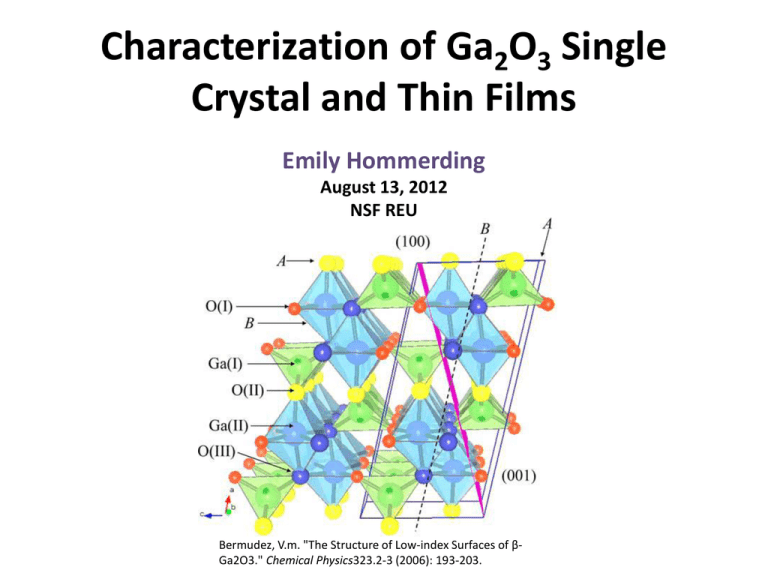
Characterization of Ga2O3 Single Crystal and Thin Films Emily Hommerding August 13, 2012 NSF REU Bermudez, V.m. "The Structure of Low-index Surfaces of βGa2O3." Chemical Physics323.2-3 (2006): 193-203. Ga2O3 • Anisotropic • Unique in that it is transparent, yet conducting • Conductivity and transparency are related to the dielectric constant • Dielectric constant not yet determined Bermudez, V.m. "The Structure of Low-index Surfaces of βGa2O3." Chemical Physics323.2-3 (2006): 193-203. XPS : X-Ray Photoelectron Spectroscopy • A sample is put in UHV Cylindrical Hemispherical Analyzer X-rays • Incoming x-rays hit the sample • Electrons leave the sample 𝐞− • Electron’s KE is measured by the CHA Ar Sputter Gun Sample in UHV • Argon ions can sputter the sample Generation of a Photoelectron hν Vacuum Conduction Band EFermi Valence Band 2p 2s 1s Conservation of Energy Equation for XPS 𝑬𝒃𝒊𝒏𝒅𝒊𝒏𝒈 = 𝑬𝒑𝒉𝒐𝒕𝒐𝒏 − 𝑬𝒌𝒊𝒏𝒆𝒕𝒊𝒄 − ∅ Energy of the incoming x-ray (k-α of Al) Binding energy of the electron in an atom on the surface Work function of the spectrometer used to measure kinetic energy Kinetic energy of the electron that has been excited from the sample Fadley, Charles S. "X-ray Photoelectron Spectroscopy: From Origins to Future Directions." Nuclear Instruments and Methods in Physics Research Section A: Accelerators, Spectrometers, Detectors and Associated Equipment 601.1-2 (2009): XPS / Sputtering Application Sputter Gun Pd deposited on the surface 𝐒𝐢𝐧𝐠𝐥𝐞 𝐂𝐫𝐲𝐬𝐭𝐚𝐥 𝐆𝐚𝟐 𝐎𝟑 The Goal: Gradually sputter away a spot of Pd for a future application XPS Line Scan of the Sputtered Spot 4 x 10 Ga 2p high resolution scan 16 x 10 5 Survey Scan 2.5 14 12 6 10 c/s 2 6 8 6 c/s 1.5 4 1 2 1 0 0.5 1130 1128 1126 1124 1122 1120 1118 1116 1114 1112 1110 4 Binding Energy (eV) x 10 1 4 0 900 800 700 600 500 400 Binding Energy (eV) 300 200 100 0 3 Pd surface coating Pd High resolution Scan 6 2.5 c/s 1000 3.5 2 1.5 1 2 3 4 5 6 1 0.5 Sputtered Spot 1 0 350 348 346 344 342 340 338 336 334 332 330 Binding Energy (eV) UV Visible Spectroscopy • UV light passes through a sample • A detector lies behind the sample • The percent of light transmitted through the system at a given wavelength is measured and compared with a reference beam Oliva, Brittany L., and Andrew R. Barron. "Connexions." Connexions. Rice University, 5 June 2010. Web. 27 July 2012. Optical Constants, Band Gap Optical Absorption Coefficient 1 1 ln d T Where d is the thickness and I T I0 The band gap is related to the optical absorption coefficient in the following way (ahn ) » ( hn -Eg ) p 𝐒𝐢𝐧𝐠𝐥𝐞 𝐂𝐫𝐲𝐬𝐭𝐚𝐥 Ga2O3 𝐔𝐕 𝐕𝐢𝐬𝐢𝐛𝐥𝐞 𝐒𝐩𝐞𝐜𝐭𝐫𝐨𝐬𝐜𝐨𝐩𝐲 Rotations of the single crystal produce differing optical properties! Ellipsometry Light Source Incident linearly polarized light of known polarization and amplitude is reflected off the top surface of a sample. Reflected light is elliptically polarized and has a change in amplitude Detector Polarizer Variable angle of incidence Linearly Polarized Light Incident on Sample Sample Analyzer Elliptically Polarized Light Leaves Sample "Light & Materials - Part I." Spectroscopic Ellipsometry Tutorial Light and Materials I. J.A. WOOLLAM CO. INC, n.d. Web. 31 July 2012. <http://www.jawoollam.com/tutorial_2.html>. Optical Properties Index of Refraction 𝐧 = 𝐧 + 𝐢𝐤 𝒄 𝐯= 𝒏 Dielectric Constant 𝛆 = 𝛆𝟏 + 𝐢𝛆𝟐 𝛆 = 𝒏𝟐 Optical Absorption Coefficient (again) 𝟒𝛑𝐤 𝛂= 𝛌 The optical absorption coefficient is the same as was used to extract band gap information in UV-Visible Spectroscopy The phase velocity of light slows down in a material The index of refraction and dielectric constant are related Ellipsometry can be used to determine.. • Optical constants • Thickness • Composition • Crystallinity Phase Amplitude 𝝆= 𝐭𝐚𝐧 𝝍𝒆𝒊∆ 𝒓𝒑 = 𝒓𝒔 Fresnel Reflectivity Equations 𝛉𝟏 𝛉𝟐 Reflected parallel 𝐧𝟏 𝐜𝐨𝐬 𝛉𝟏 − 𝐧𝟐 𝐜𝐨𝐬 𝛉𝟐 𝐫𝐩 = 𝐧𝟏 𝐜𝐨𝐬 𝛉𝟏 + 𝐧𝟐 𝐜𝐨𝐬 𝛉𝟐 Reflected perpendicular 𝐧𝟐 𝐜𝐨𝐬 𝛉𝟏 − 𝐧𝟏 𝐜𝐨𝐬 𝛉𝟐 𝐫𝒔 = 𝐧𝟏 𝐜𝐨𝐬 𝛉𝟐 + 𝐧𝟐 𝐜𝐨𝐬 𝛉𝟏 An electric field parallel to the plane of incidence is ppolarized, and perpendicular is s-polarized Single Crystal Ga2O3 Ellipsometry Data at One Orientation Angles refer to angle of incidence Something is ‘turning on’ just under 5eV .. close to Ga2O3’s band gap! Next steps… • Plot data from other orientations of the single crystal • Use a model to achieve a fit that works for each orientation Ga2O3 Single Crystal Ellipsometry at Three Orientations Two oscillator models are used to fit the data A relatively good fit for three crystal orientations and three angles of incidence is achieved, and the resulting dielectric constants are plotted Compare Single Crystal Results to Thin Films Can we differentiate a crystalline Ga2O3 thin film sample from an amorphous one? Films were deposited on a Si substrate, so it is useful to first examine the substrate by itself Dielectric constants of Si from literature Adachi, Sadao. "Model Dielectric Constants of Si and Ge." Physical Review B 38.18 (1988): 129662976. Ga2O3 Thin Film Results Ga2O3 Nominally 100nm thin film deposited on Si; Expected to be amorphous Ga2O3 Nominally 100nm thin film deposited on Si & annealed; Expected to be polycrystalline Nominally amorphous film Modeled using B-Spline with Kramers-Kronig analysis Thickness = 128 nm Roughness = 9 nm Dielectric Constants Nominally polycrystalline film Modeled using a Psemi M0 oscillator and a Cody Lorentz oscillator Thickness = 156 nm Roughness =13 nm Conclusion • Ga2O3’s unique properties can be explored for future device applications • XPS is a powerful tool for examining surface and interface features • UV-Vis can measure band gaps and identify anisotropy • Ellipsometry is a quick optical technique which can determine many material properties and optical constants Acknowledgements A special thanks to Marjorie Olmstead and Fumio Ohuchi for advising me in this project Thanks to Alejandro Garcia and Subhadeep Gupta and the NSF for facilitating the REU program May I have your questions?
